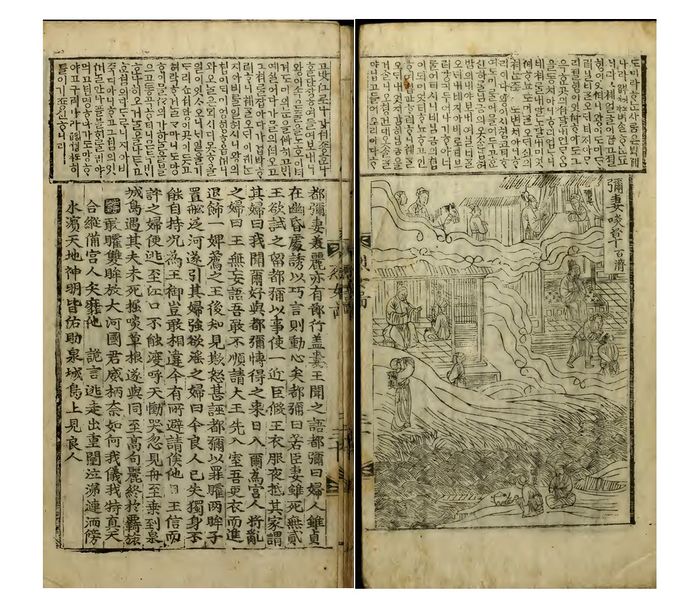(2017Translation) 彌妻啖草
| Primary Source | ||
|---|---|---|
 |
Title | |
| English | (To) Mi’s Wife chews grass | |
| Chinese | 彌妻啖草(Mi ch’ŏ tam ch’o) | |
| Korean(RR) | 미처담초 | |
| Text Details | ||
| Genre | ||
| Type | ||
| Author(s) | 偰循 (Samgang haengsil-to 三綱行實圖) | |
| Year | 1434 | |
| Source | ||
| Key Concepts | ||
| Translation Info | ||
| Translator(s) | Participants of 2017 Summer Hanmun Workshop (Intermediate Training Group) | |
| Editor(s) | ||
| Year | 2017 | |
Original Script
- 【詩】敢雙矐眸放大河. 國君威柄奈如何.
- 我儀我特眞天合. 縱備宮人矢靡他.
- 詭言逃走出重闉. 泣涕漣洏傍水濱.
- 天地神明皆佑助. 泉城島上見良人.
Translation
Student 13 : Ra Yeonjae
都彌妻. 美麗亦有節行. 盖婁王聞之. 語都彌曰. 婦人雖貞. 在幽昏處. 誘以巧言. 則動心矣.
Domi’s wife was beautiful and had a upright behavior. King GaeRu [1] heard it, told Domi, “even if your wife is chaste, seduce her with crafty words in a dark and deem place, then it might move her mind.”
Student 1 : Sanghoon Na
都彌曰. 若臣妻. 雖死無貳. 王欲試之. 留都彌以事. 使一近臣. 假王衣服. 夜抵其家.
Tomi said, "As for [your] servant's wife, even if she dies, she will not be double-minded. The king wanted to test it. He kept Tomi with work and made an intimate minister disguised with the king's attire. At night he arrived at Tomi's house.
Student 2 : Younès M'Ghari
謂其婦曰. 我聞爾好. 與都彌博得之. 來日入爾爲宮人. 將亂之.
He called the wife and said: “I heard you're fine. I gambled with To Mi and won. Tomorrow I will make you enter and become a palace concubine. I'll mess you up."
Student 3 : Petra Sváková
婦曰. 王無妄語. 吾敢不順. 請大王先入室. 吾更衣而進. 退飾一婢薦之.
The wife said: "King does not say [such] idle words. Dare I disobey? Great king, please, let me enter the room first. I will change my clothes and proceed." She retreated, dressed up one [of her] maids and pushed her.
Student 4 : (Write your name)
王後知見欺. 怒甚. 誣都彌以罪.矐兩眸子. 置船泛河. 遂引其婦. 强欲淫之.
The king afterwards knew he was deceived [and] extremely enraged, falsely accused To Mi of a crime, gouged out his two eyes, [and] put him on a boat [and sent him] floating [away on the] river. Following [this, the king] pulled To Mi's wife [to him], coercively, wanting to defile her.
Student 5 : (Jae Yong Chang)
婦曰. 今良人已失. 獨身不能自持. 况爲王御. 豈敢相違. 今有所避. 請俟他日. 王信而許之.
[His] wife said, “Now my husband had already been lost, a single woman was not sustainable alone. This situation made [me] to be the King’s servant. How dare to be against it.” Now, I have something to avoid. Please wait for other day. The king trusted and allowed it.
Student 6 : (Goeun Lee)
婦便逃至江口. 不能渡. 呼天慟哭. 忽見舟至. 乘到泉城島. 遇其夫未死. 掘啖草根. 遂與同至高句麗. 終於羇旅.
She ran away and reached mouth of a river [but] could not cross it. [She] cried to heaven and wept bitterly. Suddenly [she] saw a boat coming. She took on it and reached Ch’ŏnsŏng Island. [There] she met her husband who had not died. She dug out grassroots and chewed them. Both together went to Koguryŏ and ended up roaming about foreign land as strangers.
Student 7 : (Alexandre Le Marchand)
敢矐雙眸放大河. 國君威柄奈如何. 我儀我特眞天合. 縱備宮人矢靡他.
Having both eyes plucked out and being released into a large stream, if the king wields the power, what can a man attempt. My proper, my special, truly united by heaven, even though I am prepared to be a courtesan, by my oath I swear not to become different.
Student 8 : Bryan Sauvadet
詭言逃走出重闉. 泣涕漣洏傍水濱. 天地神明皆佑助. 泉城島上見良人.
The spiritual clairvoyance of heaven and earth are all bless and assistance.
On the top of the Ch'ônsông island a virtuous person is observable.
- ↑ King Gaeru(蓋婁王), the 4th king of Baekjae. He reigned from 128 to 166